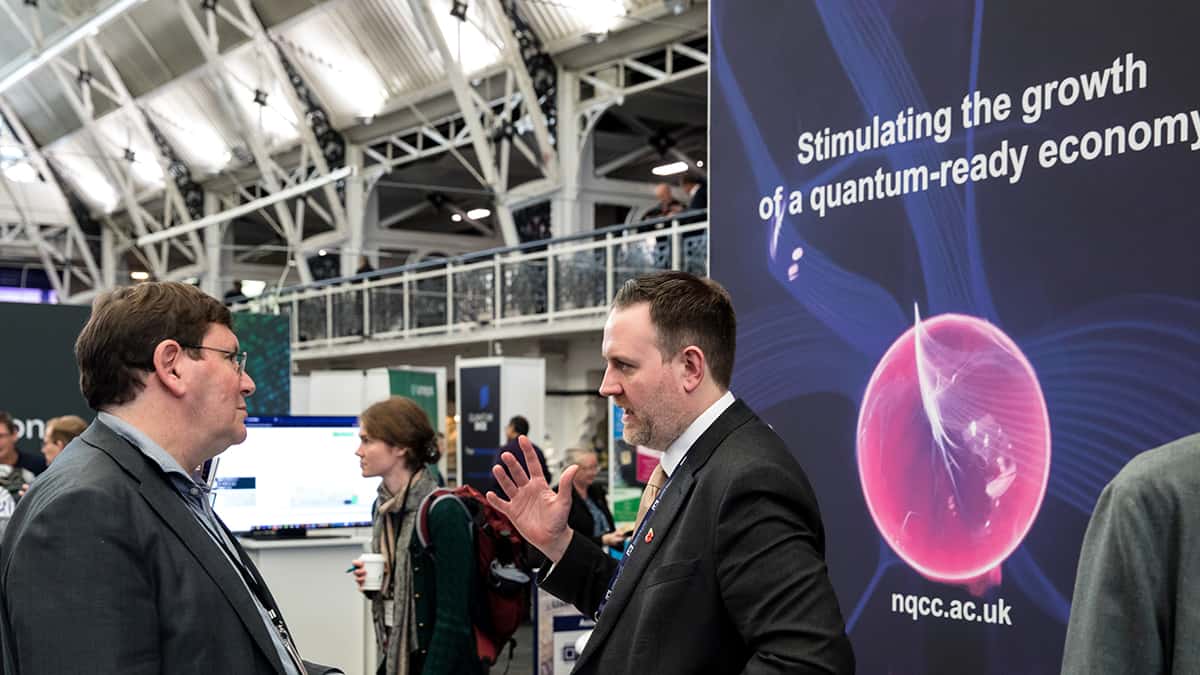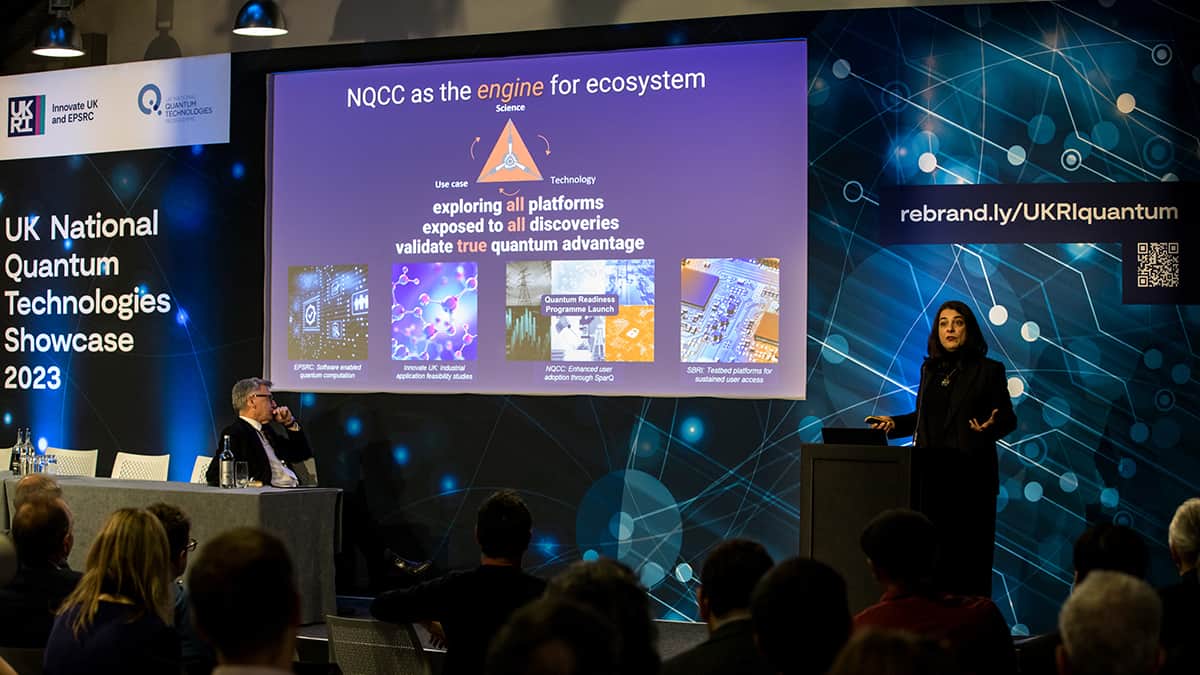One of the many factors that have contributed to the success of the UK’s National Quantum Technologies Programme (NQTP) has been its emphasis on the power of collaboration. At its inception in 2014 the NQTP established four research hubs that enabled academic groups from across the UK to share knowledge and resources, accelerating the development of novel quantum technologies and catalysing the development of a thriving start-up sector.
n
That culture of collaboration has been fully embraced at the National Quantum Computing Centre (NQCC), launched in 2020 as a flagship initiative of the NQTP. With a diverse programme of activities spanning technology development, infrastructure provision and end-user engagement, the national lab has been forging strategic links with both industrial and academic partners to deliver its headline objective of demonstrating quantum advantage – the point at which a quantum computer can solve a specific problem faster than its classical counterpart – by 2025.
n
In one notable development, announced in November 2023, an agreement with IBM Quantum will provide the NQCC and its collaborators with cloud-based access to the computing giant’s entire fleet of quantum computers. Among them are multiple machines with 127 qubits, delivering what the company terms “utility-scale” quantum computing.
n
“Quantum developers have been using small numbers of qubits for a long time, but they also need to work with larger scale machines to demonstrate how quantum computers have become useful tools for solving classes of problems beyond brute-force classical simulation of quantum mechanics,” explained IBM’s Adam Hammond, speaking at the annual National Quantum Technologies Showcase in London at the beginning of November. “Our focus at IBM is to bring forward the day when quantum computers can do work that is difficult to achieve with classical computers, and eventually to deliver a clear advantage in use cases that benefit industry and advance science.”
n
While access to the quantum hardware will be provided as a commercial service, the agreement will also enable the NQCC to join IBM’s Quantum Network, which brings together around 250 organizations from around the world. “We encourage collaborations between members of the network and with us, looking at things like algorithm development and the application of quantum computing to practical use cases where we think we can reach quantum advantage first,” explained Hammond. “We are just at the beginning of our partnership with the NQCC, and we are keen to explore how we can grow that partnership by working together and sharing our knowledge and experience.”
n

n
This latest collaboration builds on an existing technology agreement with Oxford Quantum Circuits, which provides access to its Lucy quantum processor for projects funded through the NQCC’s user engagement programme, called SparQ. At the same time the NQCC is establishing a capability in quantum emulation, a technique that enables a classical computer to run quantum circuits in the same way as a quantum machine. In this case the NQCC is leveraging a powerful software program created at the University of Oxford, called the Quantum Exact Simulation Toolkit (QuEST), and is currently working with one of the original developers to optimize its capabilities for use on the high-performance compute cluster at the Harwell Campus.
n
Meanwhile, a more established partnership with the National Physical Laboratory (NPL) extends from standards development through to technology collaboration. In one new initiative, also announced at the beginning of November, the two national facilities will be cornerstone members of a pilot network for quantum standards in the UK. “The NQCC will bring their skills and knowledge in quantum computing, as well as their connections with the start-up community, ” explains John Devaney, the NPL’s quantum standards manager. “We can share our expertise in standards development, while also keeping track of international initiatives that might influence our approach here in the UK.”
n
The Quantum Standards Network Pilot will also include representatives from government bodies, the BSI standards organization and UKQuantum, an industry association that aims to provide a single voice for companies developing quantum technologies. The aim of the pilot is to kickstart a conversation around standards and accreditation for emerging quantum platforms, find the best model for effective collaboration between key stakeholders in the UK, and make the case for a longer term focus on developing standards that support the growth of the UK’s quantum ecosystem.
n
“Standards are all about opening up markets and promoting innovation, but there is also a risk of standardizing too early or too narrowly,” says Devaney. “The pilot network will provide a forum for people to share information and discuss ideas, plus we will run workshops focused on particular industry sectors so that quantum developers can talk to potential customers about the assurances they will need to be confident that the technology will work for them.”
n
Devaney points out that the first step towards standards development is to establish proper test and evaluation protocols for diverse quantum technologies, something that NPL has been working on for many years. “We already collaborate with start-up companies and research organizations to provide independent measurements and characterization of their prototypes,” he says. “By working with the NQCC we will be able to translate those test and measurement procedures into standards that are appropriate for the UK’s quantum computing community.”
n
NPL’s expertise in quantum test and measurement will also help the NQCC’s technical teams as they establish experimental platforms based on ion traps, superconducting circuits and, in the most recent addition, neutral atoms. Beyond the characterization of these emerging computing platforms, NPL has also been developing similar quantum technologies for applications in metrology, including ion-trap devices that were originally developed for time and frequency measurements.
n
The two organizations have now secured funding to transfer an ion-trap chip originally developed at NPL to the NQCC for further development and scale-up. “This device could be really useful for quantum computing, but we do not have the resources or the infrastructure to take the technology forward,” says Guido Wilpers, a senior scientist at NPL. “The NQCC is the best place to explore and expand its capabilities for quantum computing, while we will be able to share our knowledge of the device and collaborate on future test and measurement strategies.”
n
Indeed, the first ion-trap platform to be built at the NQCC exploits a device that emerged from research at the University of Oxford, showing how pioneering work within the UK’s academic sector can enable the NQCC’s technical teams to focus on scaling up the technology rather than designing and building new devices from scratch. Over the last year quantum researchers at the NQCC have also been visiting leading academic groups in the UK to understand current best practice, make informed experimental design decisions, and explore the possibilities for future collaborations – with the ion-trap team already involved in several joint projects with academic and industrial partners.
n
Meanwhile, the NQCC’s new partnership with the Quantum Software Lab (QSL) at the University of Edinburgh is already opening up exciting new opportunities for engaging with industry on applications development. The first project in the pipeline, announced in early November, will see QSL and NQCC researchers work with high-street bank HSBC and technology provider Rigetti to develop quantum machine-learning approaches to tackle the growing problem of money laundering.
n
This collaboration aligns with the NQCC’s ambitions of exploring impactful early applications of quantum computing, showcasing the potential of the technology, stimulating user adoption, and shaping the UK’s quantum computing user community
nElham Kashefi, director of the QSL and the NQCC’s chief scientist
n
HSBC already exploits classical machine learning to detect anomalies in financial transactions that could indicate criminal behaviour, and believes that a quantum-enabled solution could reduce risk and improve its anti-fraud services. “The growing rates of financial crime globally means it is imperative that we find an enhanced way to stop people becoming a victim of fraudsters,” commented Martin Brown, a specialist in fraud analytics at HSBC. “Quantum computing has the potential to be a game changer in this arena.”
n
As part of the project, QSL will take the lead on the development of quantum machine-learning algorithms, which will then be run on Rigetti’s 24-qubit platform. But the project partners are already working closely together to develop an optimal and practical solution. “We have project meetings every two weeks to ensure that the algorithms we are developing make best use of the capabilities of the hardware,” explains Ross Grassie, the QSL’s technical programme manager. “HSBC is also really keen to to learn more about quantum machine-learning approaches, and having their involvement right from the start will help us to create a practical solution that meets their needs.”
n
For Elham Kashefi, director of the QSL and the NQCC’s chief scientist, the project shows how industry and academia can work together to accelerate innovation and develop quantum-enabled solutions that meet a clear commercial need. “This is one of the very first projects of the QSL and we are eager to use it as a working model for other projects to come,” she says. “This collaboration aligns with the NQCC’s ambitions of exploring impactful early applications of quantum computing, showcasing the potential of the technology, stimulating user adoption, and shaping the UK’s quantum computing user community.”
n

n
n
The post Partnerships push for quantum advantage appeared first on Physics World.
n
